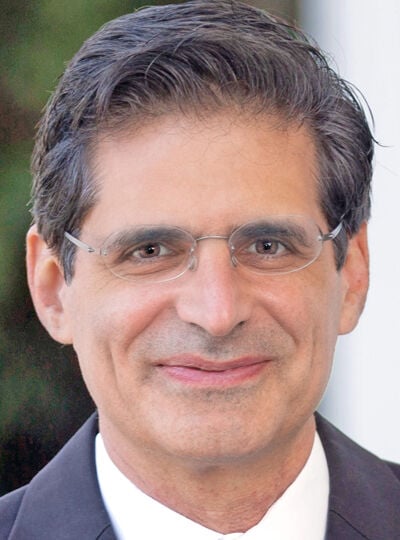The 10-month California legislative session came to a close last month, marking completion of the first lawmaking cycle for state Sen. Josh Becker, D-San Mateo, who was elected in November.
The senator worked on a range of issues, but focused primarily on education, early learning in particular, and climate issues as well as “quality of life” initiatives for the Peninsula. Becker authored six bills already signed into law and another awaiting only the governor’s final approval.
Education and child care
“We had an extraordinary year,” said Becker, referencing early education and child care accomplishments. “This would be what I would hope to achieve over a decade, we achieved this year.”
A key part of that achievement was a $2.7 billion commitment from the state budget to make transitional kindergarten available for all California 4-year-olds. Transitional kindergarten exposes pre-kindergarten age children to academic concepts, something proponents say can help bridge achievement gaps between children whose families can afford high-quality preschool and those whose can’t.
“It’s like a whole new grade essentially,” said Becker. “We went from a situation where I would say the state was behind on early learning to a situation now, where I’d say we’re [set] to be the best state in the nation to raise a child.”
Child care will also be expanded, Becker said, with funding for 200,000 additional children as well as another $1 billion from the budget for increased pay for child care workers.
Becker secured $1 million from the state budget specifically for the county’s Big Lift initiative, an effort to get all children at grade level by third grade via summer learning programs offered to low-income families. Becker, who has two children, said child care and early learning has been a focus of his since spending time on the local Child Care Partnership Council.
Also, with the pandemic in full swing, Becker noted he spent considerable tackling COVID-related issues, with a focus on reopening schools, an effort that included prioritizing teachers for the vaccine and restarting sports, as well as ensuring vaccine equity, particularly in East Palo Alto, which Becker said was hit especially hard and where vaccination rates were among the lowest.
“When I look back on my term, I spent a lot of time on that,” said Becker.
Looking forward, Becker said he will continue to focus on education, specifically with integrating technology into K-12 schools.
“We’re going to do everything we can to make sure we give local kids a chance to participate in this tech and biotech economy if they want to,” said Becker, noting that currently only 47% of high schools in the state offer computer science.
“That’s frankly a pathetic number, we need to be doing a lot better,” said Becker.
Becker introduced an education technology bill that did not make it this round, but that he will bring back next year, he said.
Related to education for adults, Becker authored Senate Bill 591, which will expand “earn and learn” opportunities for veterans, the unhoused, people exiting the justice system or others who face barriers to joining the workforce. Additionally, Becker secured $5 million for the Center for Economic Mobility planned for East Palo Alto.
Climate
The centerpiece of environmental legislation passed by Becker is Senate Bill 596, which aims to achieve net-zero greenhouse gas emissions from cement use within the state. Cement manufacturing ranks among the largest sources of carbon pollution statewide, after only oil and gas production, according to the California Air Resources Board.
Recommended for you
“This is the first bill in the country to directly target emissions from this sector,” said Becker, who added that if cement was a country it would be the third largest polluter.
Other environmental legislation Becker authored is Senate Bill 68, which has yet to receive the governor’s final approval. The bill aims to speed up, simplify and reduce the cost of residential upgrades to support things like electric vehicle charging, electric heating or solar capabilities. Such upgrades can often be costly and take months to be completed, something Becker said can dissuade people from making the shift to electric alternatives.
The bill was Becker’s most challenging, he said, drawing opposition from the state’s energy provider, Pacific Gas and Electric, which is in many cases involved with performing such upgrades.
Housing and infrastructure
On the housing front, Becker authored Senate Bill 591, legislation to allow affordable housing for elderly people and transitional age youth to be funded via tax credits, an option not previously available that had prevented some housing from being built, according to Becker’s office.
During a contentious year for housing legislation, it was “the one non-controversial housing bill,” Becker said.
Becker did support Senate Bill 9, the far from non-controversial landmark bill doing away with broad swaths of single-family zoning in the state to allow instead up to four units, but stopped short of supporting Senate Bill 10, the similarly disputed bill recently signed into law that will allow cities to streamline approval for buildings with up to 10 units.
SB 10 overrides citizen initiatives and allows for “just too many units,” Becker said.
Becker emphasized the need to approach housing challenges in a holistic manner, including spreading job growth throughout the region, not just in the Bay Area, as well as ensuring large employers are contributing to housing solutions.
“If we build 10,000 units of housing, and one of the big tech companies hires 10,000 more people, we haven’t moved forward,” said Becker.
Additional legislation by Becker this year, Senate Bill 640, will allow cities to band together when applying for state funding for infrastructure projects that could have shared benefit.
“I represent 23 smaller cities, and a lot of resources sometimes go to larger cities in the state,” said Becker, who mentioned the bill could be used to acquire funding for improvements to El Camino Real, a road that runs through several cities on the Peninsula.
Justice reform and voting
Becker’s Senate Bill 775 closes a loophole in previous legislation which put an end to charging people with murder who were involved in lesser crimes in which someone died. The new law will extend the previous legislation to lesser charges like attempted murder and manslaughter.
Senate Bill 503, a voter equity bill by Becker, creates a standard for verifying signatures on mail-in ballots. Challenged signatures that can render votes invalid disproportionately impact California voters with limited English proficiency, voters living with disabilities, first-time and aging voters, and voters of color, according to Becker.
(650) 344-5200, ext. 105


























(1) comment
Sen. Josh Becker, I didn't vote for you, but after your first year in office, am a supporter of you and your work
Thank you for your excellent service
Welcome to the discussion.
Log In
Keep the discussion civilized. Absolutely NO personal attacks or insults directed toward writers, nor others who make comments.
Keep it clean. Please avoid obscene, vulgar, lewd, racist or sexually-oriented language.
Don't threaten. Threats of harming another person will not be tolerated.
Be truthful. Don't knowingly lie about anyone or anything.
Be proactive. Use the 'Report' link on each comment to let us know of abusive posts.
PLEASE TURN OFF YOUR CAPS LOCK.
Anyone violating these rules will be issued a warning. After the warning, comment privileges can be revoked.